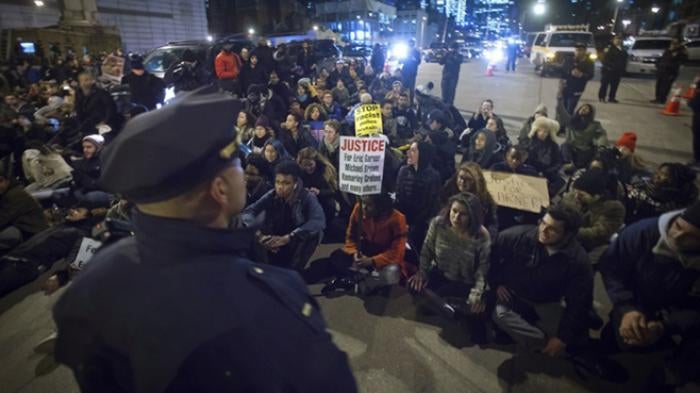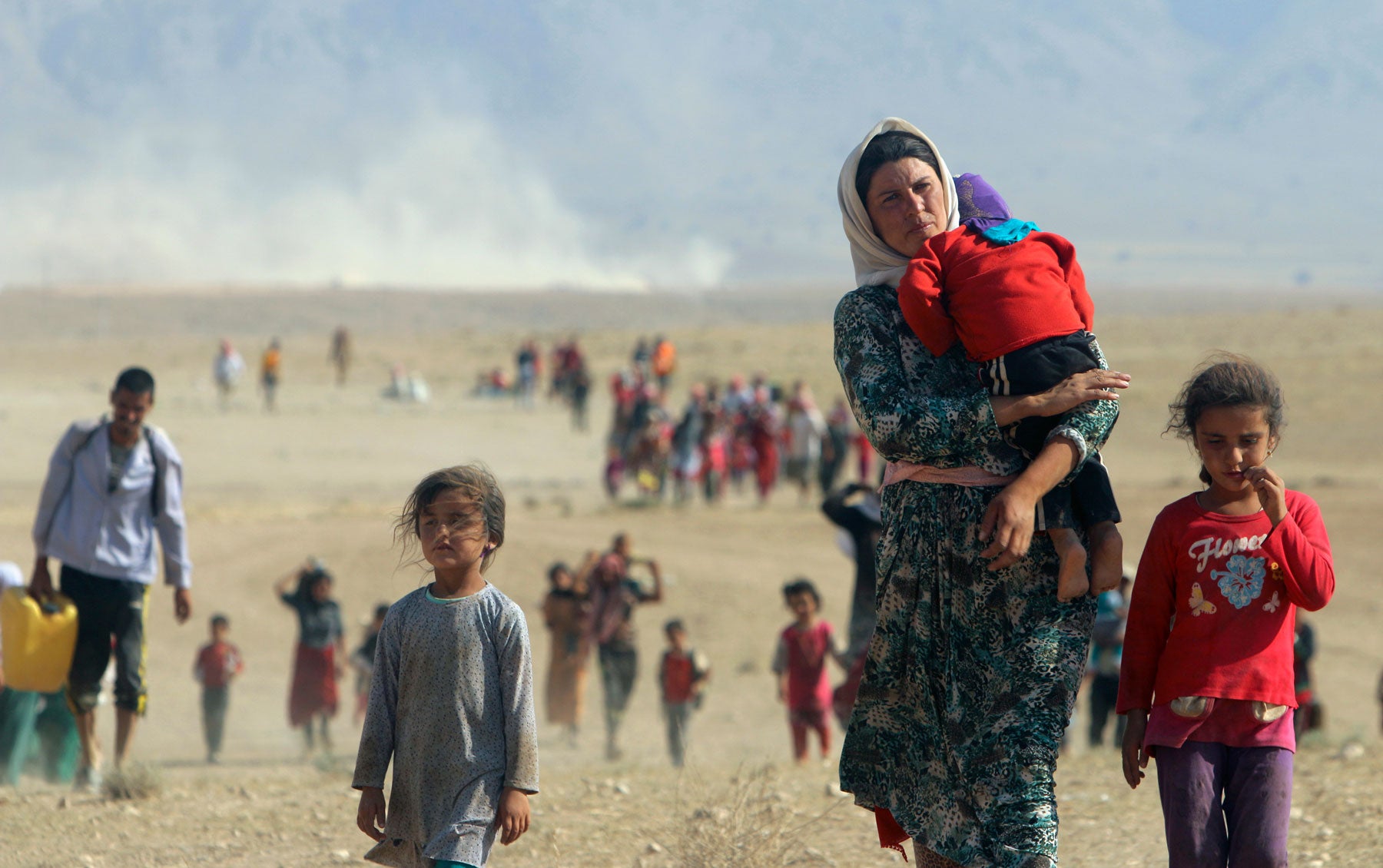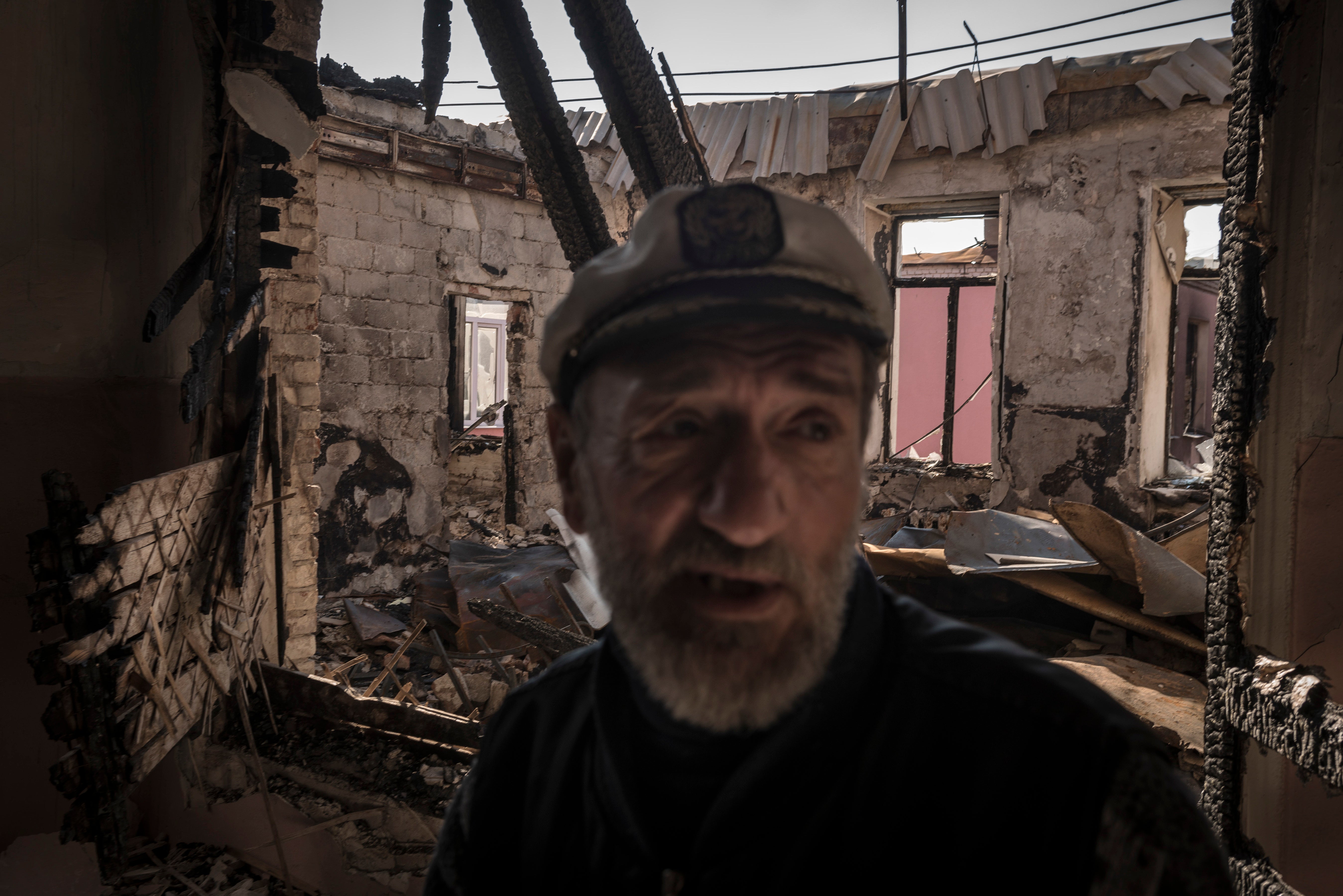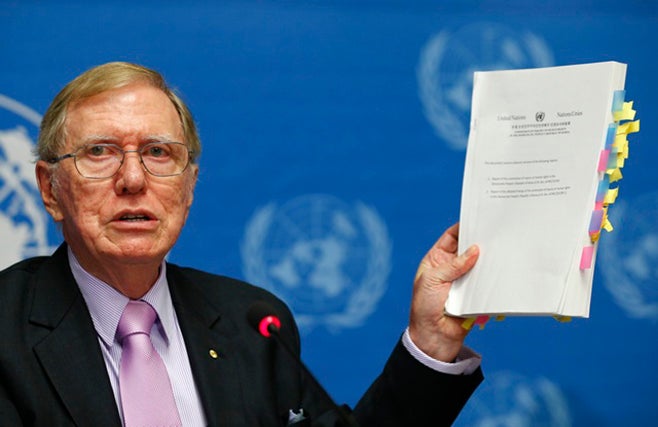The United States has a vibrant civil society and strong constitutional protections for many basic rights. Yet, particularly in the areas of criminal justice, immigration, and national security, US laws and practices routinely violate rights. Often, those least able to defend their rights in court or through the political process—racial and ethnic minorities, immigrants, children, the poor, and prisoners—are the people most likely to suffer abuses.
The August 2014 police killing of an unarmed teenager, Michael Brown, in Ferguson, Missouri, and the subsequent police crackdown on protesters, underscored the gulf between respect for equal rights and law enforcement’s treatment of racial minorities. The repressive US response to a surge in unauthorized migrants crossing the border from Mexico and Central America highlights the urgent need for US immigration policy reform.
US national security policies, including mass surveillance programs, are eroding freedoms of the press, expression, and association. Discriminatory and unfair investigations and prosecutions of American Muslims are alienating the communities the US claims it wants as partners in combatting terrorism.
A redacted summary of an extensive Senate report on CIA torture released in December is a first step toward addressing serious abuses committed in the years after the attacks of September 11, 2001, but the Obama administration has failed to bring those responsible for torture to justice.
Harsh Sentencing
Reversing 3 years of slightly declining prison populations, at the end of 2013, the state and federal prison population had grown by 0.3 percent to an estimated 1,574,700 people. At mid-2013, there were also 731,200 people in jails, resulting in a total estimated 2.3 million people behind bars, the largest reported incarcerated population in the world.
Although crime continues to decline, punitive sentencing policies continue to propel high rates of incarceration. Among state prisoners, over 46 percent were incarcerated for nonviolent drug, property, and public order offenses. In the federal system, 50 percent of federal prisoners are serving time for drug offenses.
Between 90 and 95 percent of all state and federal criminal cases are resolved by plea bargains. Prosecutors threaten defendants with far higher sentences if they do not plead and instead choose to assert their right to a trial. Among federal drug defendants, for example, those who refuse to plead receive sentences that are on average three times higher than those received by people who plead guilty. Not surprisingly, only three percent of federal drug defendants risk going to trial.
The US Sentencing Commission took a step towards fairer drug sentencing when it amended its guidelines to reduce sentences for most federal drug offenders, including over 46,000 federal prisoners currently serving unnecessarily long sentences who now will be eligible to seek a reduction.
For the first time in 3 years, no states changed their laws to abolish the death penalty; 18 states and the District of Columbia do not impose death sentences. Washington State Governor Jay Inslee announced in February that he would grant reprieves to any death penalty case that came before him, instituting, in effect, a moratorium.
At time of writing, 33 people had been executed in the US in 2014, by lethal injection. Due to European drug manufacturers’ ban on the use of their products for executions, many US states are using experimental drug combinations, while refusing to disclose their composition. At least four of the men executed in 2014 showed visible signs of distress before they died.
Racial Disparities in Criminal Justice
Racial disparities have long plagued the US criminal justice system. African American men are incarcerated at six times the rate of white men, and three percent of all black males are currently incarcerated in a state or federal prison. There are many causes of racial disparities in incarceration, including drug law enforcement practices. For example, whites and African Americans engage in drug offenses at comparable rates, but are arrested, prosecuted, and incarcerated for drug offenses at vastly different rates.
Although African Americans are only 13 percent of the US population, they represent 31 percent of all drug arrests and 41 percent of state and 42 percent of federal prisoners serving time for drug offenses. African Americans are nearly four times more likely than whites to be arrested for marijuana possession.
Racial disparities in criminal justice contributed to the outrage that erupted in Ferguson, Missouri, following the August police killing of Michael Brown, an unarmed 18-year-old African American. While Ferguson protests began in response to that shooting, they revealed longstanding problems between the predominantly black Ferguson community and the almost entirely white police force. In response to the protests, law enforcement agencies in a number of instances used teargas, rubber bullets, and other intimidating tactics in apparent violation of the right to peaceful assembly and freedom of expression, and engaged in possible excessive use of force.
Drug Policy Reform
Since the 1980s, the US has spent hundreds of billions of dollars to arrest and incarcerate drug offenders in the US. Its heavy reliance on criminal laws for drug control has had serious human rights costs, including infringement of the autonomy and privacy rights of those who simply possess or use drugs.
In 2014, voters in Oregon and Alaska approved measures to legalize the production, sale, distribution, and use of marijuana for recreational purposes, joining Colorado and Washington State. The District of Columbia also decriminalized possession of small amounts of marijuana for personal use. New York, Maryland, and Minnesota joined 20 states and the District of Columbia in legalizing marijuana for medical purposes.
Prison Conditions
Pressed by litigation and public advocacy, some US states and local governments are reconsidering their solitary confinement policies. Ohio agreed to lessen and eventually end the use of solitary confinement in its juvenile facilities. New York corrections officials agreed to develop strict new guidelines, limiting the use of solitary as a punishment except for the most severe infractions and eliminating the use of solitary confinement for inmates younger than 18. In California, a federal court ordered prisons to change policies on the use of solitary as punishment for prisoners with mental illness. Nonetheless, many prisoners and jail inmates—including children—are still held in harsh conditions of nearly round-the-clock isolation and idleness, often for months or even years on end.
Poverty and Criminal Justice
Many poor defendants across the country languish in pretrial detention in large part because they cannot afford to post rising bail costs. Extremely high court and monitoring fees are also increasingly common, as cash-strapped counties and municipalities often expect their courts to pay for themselves or even tap them as sources of public revenue. The impact on poor defendants is particularly harsh.
In 2014, Human Rights Watch reported on widespread abuses linked to the privatization of misdemeanor probation services in several US states. Operating under an “offender-funded” model, probation companies charge offenders directly for their services and may secure the arrest of those who fail to pay. Fees are structured in ways that penalize the poor, and there is a general lack of proper government oversight or accountability.
In April, Georgia Governor Nathan Deal vetoed a bill that would have helped shield probation companies from public scrutiny. Georgia’s legislature is likely to take the issue up again in 2015, and will have an opportunity to introduce badly-needed oversight and accountability mechanisms that could be a model for other states.
Youth in the Criminal Justice System
Every US jurisdiction allows children under the age of 18 to be prosecuted as adults and sentenced to adult prison terms in certain circumstances. At the end of 2013, 1,200 children were being held in adult state prison facilities. Florida held a greater number of children in adult facilities than any other state, partly as a result of its policy of granting prosecutors sole discretion over the prosecution of children in adult court. Fourteen other states also permit prosecutors to send children to adult courts for prosecution without judicial review in at least some cases.
States continue to grapple with a US Supreme Court decision banning mandatory life without parole sentences for youth offenders convicted of homicides. While a majority of US states have found the Supreme Court ruling to be retroactive, in July, the Michigan Supreme Court found that the decision did not apply to youth already serving mandatory life without parole sentences.
Rights of Non-Citizens
From October 2013 through September 2014, US Customs and Border Protection apprehended 68,541 unaccompanied children from Central America and Mexico and 68,445 non-citizens in family units near the US-Mexico border. These figures represent 77 percent and 361 percent increases from the previous year, respectively. In response, the Obama administration dramatically expanded detention of unauthorized families and expedited deportations. In October, Human Rights Watch documented how Central American migrants who had fled to the US fearing for their lives were deported without sufficient opportunity to seek protection.
In June, the administration opened the first of three new family detention centers dedicated primarily to holding and facilitating the deportation of mothers and children from Central America. Many detained families are seeking asylum; yet, even when the US finds them to have a credible fear of returning to their countries, it denies them release on bond, categorically arguing that they are “national security” threats without conducting individualized risk assessments.
Legislative efforts toward legal status for millions of unauthorized migrants in the US foundered in 2014. In November, the Obama administration announced executive branch policy changes to provide temporary legal status to over four million unauthorized immigrants without certain criminal convictions who have lived in the United States for five years or more and have US citizen or legal permanent resident children. These policies will likely protect millions of families from the threat of arbitrary separation. However, they do not alter border policies that result in the summary deportation and criminal punishment of people with deep ties to the US.
In 2014, over 166 local jurisdictions instructed police not to fulfill some requests from federal authorities to further detain apprehended non-citizens for immigration reasons under a program known as “Secure Communities.” President Barack Obama’s November executive action limited such federal-local collaboration on immigration matters, recognizing it had exacerbated mistrust of law enforcement.
Labor Rights
Hundreds of thousands of children work on US farms. The 1938 Fair Labor Standards Act exempts child farmworkers from the minimum age and maximum hour requirements that protect other working children. Child farmworkers often work 10 or more hours a day and risk pesticide exposure, heat illness, and injuries.
Child labor is common on tobacco farms in the US, the world’s fourth largest tobacco producer. Child tobacco workers suffer vomiting, headaches, and other symptoms consistent with acute nicotine poisoning.
Congress has not closed a legal loophole allowing children to do hazardous work in agriculture at 16; hazardous work is prohibited in all other jobs until 18. US laws and regulations include no special provisions to protect child tobacco workers from nicotine exposure.
Health Policy
US military veterans face systemic barriers in accessing health care, including long delays in obtaining adequate care at Department of Veteran Affairs (VA) health centers.
Tens of thousands of veterans are unable to get effective help to prevent overdose, treat opioid dependence, and end chronic homelessness. The US Congress passed the Veterans' Access to Care through Choice, Accountability and Transparency Act of 2014 in August, to improve and expand veterans' access to medical services.
Thirty-four states have criminal laws that punish HIV-positive people for exposing others to the virus. In June, Iowa became the first to amend (but not fully repeal) its criminalization statute.
Women’s and Girls’ Rights
In June, the US Supreme Court ruled in Burwell v. Hobby Lobby Stores, Inc. that certain for-profit corporations can refuse to cover contraception in employee health insurance plans based on the corporate owner’s religious views that life begins at conception. Over two-thirds of employed US adults under 65 get their health insurance through an employer.
While state legislatures enacted fewer regulations targeting abortion providers in 2014, the impact of the surge in restrictions from 2011 to 2013 became more visible. In Texas, the number of abortion clinics has declined by almost half since 2011, with more closures possible depending on the outcome of litigation over onerous abortion provider and facility requirements passed in 2013.
One in five women is sexually assaulted in college, according to a 2010 report by the US Centers for Disease Control and Prevention. In January, the Obama administration established the White House Task Force to Protect Students from Sexual Assault, which published its first set of recommendations in April. Meanwhile, survivors from colleges across the country continued to expose how schools and local police mishandled their cases.
Police in Memphis, Detroit, and Cleveland analyzed forensic exams (rape kits) that had been left in storage for years. The test results led to the discovery of dozens of serial rapists and scores of indictments. The backlogs underscored a broader problem of police not properly investigating sexual assaults.
Following Human Rights Watch’s exposure of the Metropolitan Police Department’s mishandling of sexual assault cases, the District of Columbia Council passed a law establishing independent oversight of police and allowing victims to have an advocate present during police interviews.
Sexual Orientation and Gender Identity
At time of writing, same-sex couples can marry in 35 states, the District of Columbia, and the city of St. Louis. The US Supreme Court decided in October 2014 to let stand three federal appeals court rulings that overturned same-sex marriage bans in five states, and since then has declined to intervene in similar cases.
President Obama signed an executive order in June 2014 that prohibits workplace discrimination on grounds of sexual orientation or gender identity by companies awarded federal contracts and outlaws discrimination based on gender identity for federal employees. In August 2014, in response to a 2012 Equal Employment Opportunity Commission decision, the US Department of Labor announced plans to issue new guidance making clear that discrimination on the basis of transgender status is prohibited under the existing definition of discrimination based on sex in Title VII of the Civil Rights Act of 1964.
However, the US Supreme Court’s broad interpretation of religious exemption in the Hobby Lobby case could set a precedent undermining protections for lesbian, gay, bisexual, and transgender (LGBT) people on religious grounds.
Twelve US states retain sodomy laws. Since April 2013, legislatures in Montana and Virginia have repealed their states’ sodomy laws. Louisiana’s legislature voted to uphold the state’s law in April 2014.
National Security
For the 13th year, the US detained men at Guantanamo Bay without charge or trial; at time of writing, 143 detainees remained at the facility. The Obama administration resumed transfers from Guantanamo in August 2013 after a long lull, sending 11 detainees to their home or third countries by the end of that year. In late 2013, Congress added new provisions to the National Defense Authorization Act (NDAA) that gave the administration more flexibility to make transfers. Yet, since the change, the pace of transfers out of Guantanamo has not changed significantly; at time of writing, only 12 detainees had been transferred out of Guantanamo in 2014.
The Defense Department continued to force-feed Guantanamo detainees on hunger strike using methods that remain classified and has stopped reporting on the number of ongoing hunger strikes. The few details disclosed raise serious concerns that the forced-feedings violate medical ethics and care standards, and amount to ill-treatment under international law. A federal court ordered the release of videos of the forced-feeding of one detainee but refused to issue an injunction to change the forced-feeding procedures. The US, at time of writing, was considering appealing the decision regarding the release of the videos.
The Obama administration continued to pursue cases before the military commissions at Guantanamo Bay. This system fails to protect attorney-client communications, allows the introduction of coerced evidence, and uses rules that block defense counsel from access to information essential to the case—such as their clients’ treatment while in secret CIA custody.
The US brought one new case in the commissions against a detainee accused of crimes connected to attacks on US troops in Afghanistan, among other allegations. Two other pending cases, including the one against five men accused of plotting the September 11, 2001 attacks, languished in pretrial hearings, with a trial date likely years away.
In July, Human Rights Watch released a report documenting abusive counterterrorism investigations against often vulnerable American Muslims, including indigent people or those with intellectual and mental disabilities, who were unlikely to ever have been involved in terrorist activities were it not for the government’s involvement. The government also makes use of overly broad material support charges, prosecutorial tactics that may violate fair trial rights, and harsh conditions of confinement.
The US continued to conduct targeted killing operations in Afghanistan, Pakistan, Yemen, and Somalia, purporting to follow administration policy guidelines announced in 2013 that the targets of strikes pose a continuing, imminent threat to the US and that there be near certainty that no civilians will be harmed.
A Human Rights Watch investigation of a December 2013 strike on a wedding procession in Yemen that killed 12 people and wounded at least 15 more found that many, if not all, of those killed were civilians, contrary to the policy guidelines and in apparent violation of the laws of war. The Yemeni government reportedly paid more than US$1 million in total to the families of those killed or injured in the strike. Payments were also reportedly made to the relatives of an anti-Al-Qaeda cleric killed in a US drone strike in 2013.
US policy and practice of targeted killings remained shrouded in secrecy. In response to a court case, the administration was forced to disclose a Justice Department memo, substantially redacted, providing the legal rationale for a strike that killed a US citizen in Yemen in 2011. However, the administration has not provided the legal memoranda justifying targeted killings in other contexts.
The US Senate Intelligence Committee released in December a 499-page redacted executive summary of a 6,700-page report on the Central Intelligence Agency ’s (CIA) detention and interrogation program. The report shows that the interrogation techniques used by the CIA were far more brutal and widespread than previously reported, including previously unreported forms of torture and sexual assault such as “rectal rehydration.” The report also found that the interrogation techniques used by the CIA were ineffective at gathering useful or valuable intelligence, and that the CIA repeatedly lied about the program and for years sought to cover up its crimes. The US has failed to prosecute the US officials responsible for authorizing and carrying out torture and other ill-treatment of detainees in US custody since 9/11.
Documents leaked to journalists by former National Security Agency (NSA) contractor Edward Snowden continued to reveal new details about US surveillance programs. In the last year, reports based on the Snowden documents show that the US may be collecting millions of text messages worldwide each day and intercepting all phone calls and metadata in the Bahamas and Afghanistan, and gathering all phone metadata in Mexico, Kenya, and the Philippines. A July news story said several prominent American Muslim leaders, including the head of a Muslim civil liberties group, were targeted with electronic surveillance.
On January 17, 2014, President Obama announced additional measures to restrict the use, retention, and dissemination of personal data gathered by intelligence services in Presidential Policy Directive 28. However, these measures fell short of ensuring that interference with privacy was limited to what was necessary and proportionate, and they left open the possibility of large-scale collection. Also, while the measures purported to bring rules on surveillance of non-US persons (foreigners abroad) closer to those governing data collected on US persons, the rules are vague and create no justiciable rights.
In March, the UN Human Rights Committee called on the US to ensure that its surveillance activities respect privacy rights under the International Covenant on Civil and Political Rights, regardless of the nationality or location of individuals being monitored. It also expressed concern over the lack of transparency in US laws and court rulings governing surveillance.
In July, Human Rights Watch released a report documenting how large-scale US surveillance is hampering journalists and lawyers in their work, making it more difficult to protect sources, and leading journalists to go to extreme lengths to avoid detection: from using encryption to burner phones, to ceasing all electronic communication. As a result, far less information about matters of public concern may be seeing the light of day.
Also in July, Senator Patrick Leahy introduced a new version of the USA Freedom Act that would have limited some forms of domestic surveillance, while doing almost nothing to safeguard the privacy of foreigners abroad. However, it failed to move forward in the Senate.
Foreign Policy
In August, the US launched air strikes against the extremist group Islamic State (also known as ISIS) forces in Iraq as part of a US-led coalition that includes five Arab countries; in September, the US expanded the air strikes to Syria against ISIS and another extremist group, Jabhat al-Nusra. President Obama also announced he was deploying additional US military personnel to Iraq and was increasing military assistance to armed groups opposed to the Assad government in Syria.
Following the disputed presidential election results in Afghanistan in April and August, US Secretary of State John Kerry helped broker a power-sharing agreement in Afghanistan. US troops prepared to withdraw from Afghanistan by the end of the year, leaving about 10,000 to train, advise, and assist Afghan security forces. The US signed a Bilateral Security Agreement with the new Afghan government in October.
Following the ouster of Ukrainian President Viktor Yanukovich in February and ensuing violence, the US placed sanctions on Russia’s financial, energy, and defense sectors.
In June and September, the Obama administration announced a US ban on the production and acquisition of antipersonnel landmines as well as on their use outside of the Korean peninsula, measures that bring it in closer alignment with the Mine Ban Treaty.
In August, the US hosted 45 African heads of state at the first US-Africa Summit, with discussions focusing on economic development, governance, and security.






